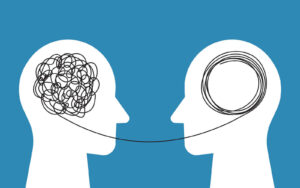Internal Family Systems is a type of psychotherapy that focuses on the “parts” that make up your sense of self.

IFS uses the idea that the mind is broken up into different sub-personalities. Each personality plays a different role. Each “part” has its own qualities and different viewpoints.
Even though IFS is nothing new, there are still many people who don’t know exactly what it is or how it can help.
With that in mind, let’s break down Internal Family Systems. By reviewing the basics of IFS, you can decide if it’s the right therapy option for you, and learn more about what to expect throughout your treatment.
How Does Internal Family Systems Work?
The Internal Family Systems model breaks down the brain into three parts:
- Managers
- Exiles
- Firefighters
Managers are responsible for how you interact with the world.
They’re the thoughts and actions that keep you protected from perceived threats, and they try to keep traumatic experiences from completely taking over your thoughts.
Exiles are feelings of shame, guilt, or practically any type of pain that stems from the past—often from childhood.
They’re called “exiles” because managers and firefighters work within the brain to keep them from entering your conscious mind. As a result, you feel less pain.
 Firefighters respond to “emergencies.”
Firefighters respond to “emergencies.”
When exiles try to demand your attention, firefighters work to distract you from the pain they might cause. Unfortunately, they can often distract you by leading you toward unhealthy coping mechanisms, including substance abuse.
Recognizing the Self
Even though IFS is made up of different systems, it also sees people as being a whole unit that encompasses a collection of parts.
The Self is the center of your spirituality, separate from the rest of your parts. It has healing qualities and, when properly accessed, promotes everything from curiosity to connectivity. Even if you feel like your state of mind is mostly controlled by your parts, the Self remains. It should always be your goal to keep it in a state of control.
Untangling the Parts
Once you have a better understanding of the parts noted in IFS, you can determine if one seems to be “taking over.” Or, if it feels like your parts are tangled and causing chaos.
If that’s the case, an IFS therapist can help you put the parts back in their rightful places. They will guide you to have greater access to the Self. Not only will you feel more in control, but you can start to heal each individual part. The Self promotes healing. It can help to ensure each part is working together as a unit, rather than clashing and causing problems.
How IFS Can Help

If something like anxiety, depression, or trauma has caused your parts to become jumbled or encouraged them to work against each other, working with a therapist can help to put things back in order and keep the Self in control of everything.
Whether you’re interested in learning more about Internal Family Systems or you think it might be the right type of treatment for you, feel free to contact me. Together, we can talk more about what to expect and how it can help you start to heal.
Begin IFS Therapy in Phoenix, Scottsdale, and online in AZ
Understanding the different aspects of ourselves can be difficult without the right support. Our team of caring therapists would be happy to offer support from our Phoenix, Scottsdale, and online in all of Arizona. We would be honored to help you have greater access to yourself, and each part that makes you who you are. To start your therapy journey, please follow these simple steps:
- Contact Crossroads Counseling
- Meet with an IFS therapist
- Start becoming more in tune with yourself!
Contact us by calling 623-680-3486, texting 623-688-5115, or emailing info@crossroadsfcc.com and ask to speak with one of our child counselors. You can ask all the questions you have to see if Crossroads is the right fit for you.

